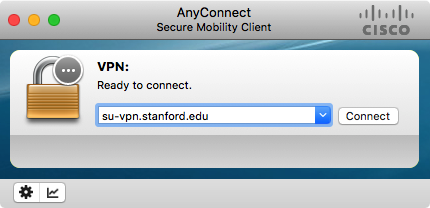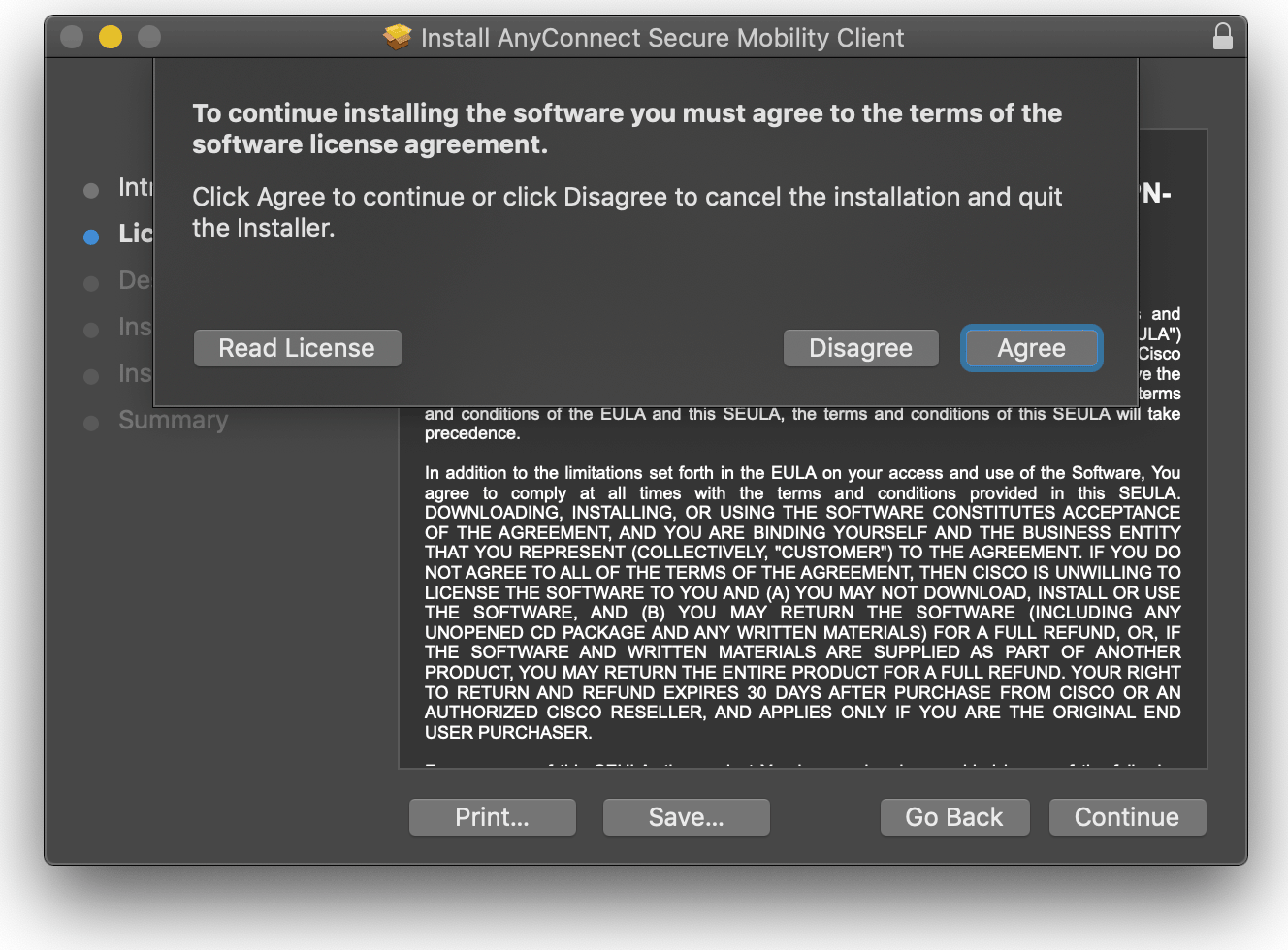Cisco AnyConnect Secure Mobility Client wants to export key 'Apple ID Authentication (date/time)' from your keychain. Launch the DART tool from the Cisco Anyconnect Secure Mobility Client. Encrypt the DART bundle with a password (optional) and run the tool, it will be saved on the desktop by default.
- Cisco Anyconnect Secure Mobility Client Mac Os Mojave
- Cisco Anyconnect Mac Os Download
- Cisco Anyconnect Vpn Download

Cisco AnyConnect Secure Mobility Client is a Virtual Private Network (VPN) client that works on a large selection of operating systems and hardware configurations. The new Cisco AnyConnect Secure Mobility Client and support will operate under Mac OS X, Windows, and Linux. Additionally, there are device-specific versions for many common mobile devices like iPad, iPhone or Android phones. Cisco AnyConnect Secure Mobility Client 4.7 has been released and is available for download. In case you’ve installed a previous version of this program, it should automatically update to the most recent version. However, for any reason, if you are unable to update, you can easily download it again and install a fresh copy of the program. Cisco AnyConnect is a free VPN software that’s used to connect to the Cisco VPN servers. AnyConnect isn’t merely a VPN but also includes hosts of additional attributes like endpoint security for businesses, telemetry, web security, network access management.
Download Cisco AnyConnect
Also, please have in mind that you need to activate active your AnyConnect Apex, Plus or VPN Only subscription with Cisco to download the latest AnyConnect VPN client software. To do this you need to log in with your Cisco ID and password and you’ll be able to download the software without any issues.
Download the Cisco AnyConnect VPN Client:
How to install the Cisco AnyConnect Client on Windows 10
- Find and double click the downloaded file of the Cisco AnyConnect Client.
- Now just follow the screen titled “Welcome to the Cisco AnyConnect Secure Mobility Client Setup Wizard”, click Next.
- When presented with the software license agreement, click I accept on the slide-down menu and click Next.
- Click Install when prompted (Note: the user must be an administrator of the machine to install).
Note: You may be warned the program comes from an unknown publisher and asked to confirm that you want to allow it to make changes to your computer. Click Yes to continue. - When installer begins installation you will see
- Click Finish when prompted to complete the installation.
This is it, you have successfully installed Anyconnect client.

Starting and connecting to the VPN using AnyConnect
- For this, you need to Open recently installed software: Cisco AnyConnect Secure Mobility Client you can do this from Start Menu.
- Now you need to select the connection from the list. If this field is blank, you should manually type in the server URL. Most of the time, network administrators will configure a VPN profile for the users. So the default connection will automatically be listed in the drop-down menu.
- Click Connect
- You will be asked to enter your Username and Password.
- After entering your credentials, press Ok.
Once the connection is successful, AnyConnect will automatically minimize itself in the system tray. To disconnect from the VPN, double-click the AnyConnect icon from the system tray and press the Disconnect button.
Cisco AnyConnect is the recommended VPN client for Mac. The built-in VPN client for Mac is another option but is more likely to suffer from disconnects.
Overview
Stanford's VPN allows you to connect to Stanford's network as if you were on campus, making access to restricted services possible. To connect to the VPN from your Mac you need to install the Cisco AnyConnect VPN client.

Two types of VPN are available:
Cisco Anyconnect Secure Mobility Client Mac Os Mojave
- Default Stanford (split-tunnel). When using Stanford's VPN from home, we generally recommend using the Default Stanford split-tunnel VPN. This routes and encrypts all traffic going to Stanford sites and systems through the Stanford network as if you were on campus. All non-Stanford traffic proceeds to its destination directly.
- Full Traffic (non-split-tunnel). This encrypts all internet traffic from your computer but may inadvertently block you from using resources on your local network, such as a networked printer at home. If you are traveling or using wi-fi in an untrusted location like a coffee shop or hotel, you may wish to encrypt all of your internet traffic through the Full Traffic non-split-tunnel VPN to provide an additional layer of security.
You can select the type of VPN you want to use each time you connect.
Install the VPN client
Cisco Anyconnect Mac Os Download
- Download the Cisco AnyConnect installer for Mac.
- Double-click the InstallAnyConnect.pkg file to start the Cisco AnyConnect Installer wizard.
- When the Welcome window displays, click Continue.
- Select your hard drive as the destination where you want to install Cisco AnyConnect and then click Continue.
- Click Install to perform a standard installation of the software.
- At the prompt, enter your administrator account password for the Mac and click Install Software.
- When the software has finished installing, click Close.
Connect to the Stanford VPN

- To launch the VPN client, open your Applications folder and navigate to Cisco > Cisco AnyConnect Secure Mobility Client.app.
- When prompted for a VPN, enter su-vpn.stanford.edu and then click Connect.
- Enter the following information and then click OK:
- Group: select Default Stanford split- tunnel (non-Stanford traffic flows normally on an unencrypted internet connection) or Full Traffic non-split-tunnel (all internet traffic flows through the VPN connection)
- Username: your SUNet ID
- Password: your SUNet ID password
- Next, the prompt for two-step authentication displays.
- Enter a passcode or enter the number that corresponds to another option(in this example, enter 1 to authenticate using Duo Push on an iPad). You may have to scroll down the list to see all of your options. Then click Continue.
- If your only registered authentication method is printed list, hardware token, or Google Authenticator, the menu does not display. Enter a passcode in the Answer field and click Continue.
- Click Accept to connect to the Stanford Public VPN service.
- Once the VPN connection is established, the Cisco AnyConnect icon with a small lock appears in the dock.
Disconnect from the Stanford VPN
Cisco Anyconnect Vpn Download
- Click the Cisco AnyConnect icon with a small lock.
- At the prompt, click Disconnect.